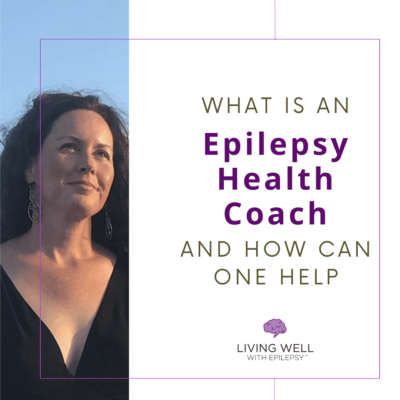 This blog post is sponsored by SK Life Science, Inc.
This blog post is sponsored by SK Life Science, Inc.
An Epilepsy Advocate Making A Difference in Communities of Color
JenVon Cherry, is not only an epilepsy advocate and founder of the nonprofit organization, Epitome of Epilepsy, which is dedicated to supporting the epilepsy community, particularly those in communities of color, she is also living with epilepsy herself.
Learning to Accept the Challenges of Epilepsy
JenVon’s own epilepsy story mirrors the unpredictability of living with epilepsy. After being diagnosed in kindergarten, she faced numerous hurdles. She began facing adversity as a child in school with a lack of support
or understanding of her condition, which continued through adulthood and her career. Between constant misunderstandings with employers who couldn’t grasp the complexities of epilepsy, and lack of resources within her community, these conditions severely impacted JenVon’s progression in her career. One of the most heartbreaking impacts of JenVon’s journey with epilepsy has been her inability to have children due to medication-induced pre-menopause.
Offering Hope to Communities of Color
Yet, JenVon’s determination never wavered. Growing up without resources for epilepsy patients inspired her to transform her struggles into a platform for advocacy, particularly for Black and Brown communities where she felt the need was the greatest. Through her non-profit organization, Epitome of Epilepsy, JenVon is a beacon of hope and support for those affected by epilepsy in the Charleston, SC, area. With a focus on education, inspiration, and advocacy, JenVon does not want others with epilepsy to go through the same battles she endured as a child.
A Vocal Epilepsy Advocate for Shared Decision Making
JenVon has been vocal about the importance of having a shared decision-making approach with her doctors when it comes to a treatment plan. With her doctor’s guidance, JenVon started treatment with XCOPRI (cenobamate tablets) CV, a prescription medication indicated for the treatment of partial-onset seizures in adults aged 18 and older.
More on XCOPRI
Like any medication, XCOPRI has risks and benefits. Do not take XCOPRI if you are allergic to it or have a genetic problem (called familial short QT syndrome) that affects the electrical system of the heart. XCOPRI can have serious side effects including serious allergic reaction which may affect organs and other parts of your body like the liver or blood cells. XCOPRI may cause problems with the electrical system of the heart (QT shortening). Antiseizure drugs, including XCOPRI, may cause suicidal thoughts or actions in a very small number of people, about 1 in 500. Call your doctor right away if you have suicidal thoughts or actions, or new or worsening depression, anxiety, or irritability. XCOPRI may cause problems that affect your nervous system, including dizziness, trouble walking or with coordination, feeling sleepy and tired, trouble concentrating, remembering and thinking clearly, and vision problems. Do not drive, operate heavy machinery, or do other dangerous activities until you know how XCOPRI affects you.
These are not all of XCOPRI’s side effects. I encourage you to read the Important safety information included at the end of this article.
With XCOPRI, JenVon has led a life with fewer seizures.
For anyone considering a new path in managing epilepsy, discussing options like XCOPRI with a neurologist or epileptologist can be a critical step. Additional information is available at XCOPRI.com. While JenVon is a real XCOPRI patient, as with all medications, individual results may vary.
Through platforms like Living Well with Epilepsy, we continue to bridge the gap between medical professionals and those of us living with epilepsy every day. My hope is that by sharing our stories, we not only inspire but also ignite change in how epilepsy is perceived and treated within our communities. To learn more about JenVon’s story, check out her recent RealHealth.com article.
IMPORTANT SAFETY INFORMATION and INDICATION for XCOPRI® (cenobamate tablets) CV
DO NOT TAKE XCOPRI IF YOU:
- Are allergic to cenobamate or any of the other ingredients in XCOPRI.
- Have a genetic problem (called Familial Short QT syndrome) that affects the electrical system of the heart.
XCOPRI CAN CAUSE SERIOUS SIDE EFFECTS, INCLUDING:
Allergic reactions: XCOPRI can cause serious skin rash or other serious allergic reactions which may affect organs and other parts of your body like the liver or blood cells. You may or may not have a rash with these types of reactions. Call your healthcare provider right away and go to the nearest emergency room if you have any of the following: swelling of your face, eyes, lips, or tongue, trouble swallowing or breathing, a skin rash, hives, fever, swollen glands, or sore throat that does not go away or comes and goes, painful sores in the mouth or around your eyes, yellowing of your skin or eyes, unusual bruising or bleeding, severe fatigue or weakness, severe muscle pain, frequent infections, or infections that do not go away. Take XCOPRI exactly as your healthcare provider tells you to take it. It is very important to increase your dose of XCOPRI slowly, as instructed by your healthcare provider.
QT shortening: XCOPRI may cause problems with the electrical system of the heart (QT shortening). Call your healthcare provider if you have symptoms of QT shortening including fast heartbeat (heart palpitations) that last a long time or fainting.
Suicidal behavior and ideation: Antiepileptic drugs, including XCOPRI, may cause suicidal thoughts or actions in a very small number of people, about 1 in 500. Call your health care provider right away if you have any of the following symptoms, especially if they are new, worse, or worry you: thoughts about suicide or dying; attempting to commit suicide; new or worse depression, anxiety, or irritability; feeling agitated or restless; panic attacks; trouble sleeping (insomnia); acting aggressive; being angry or violent; acting on dangerous impulses; an extreme increase in activity and talking (mania); or other unusual changes in behavior or mood.
Nervous system problems: XCOPRI may cause problems that affect your nervous system. Symptoms of nervous system problems include: dizziness, trouble walking or with coordination, feeling sleepy and tired, trouble concentrating, remembering, and thinking clearly, and vision problems. Do not drive, operate heavy machinery, or do other dangerous activities until you know how XCOPRI affects you.
Do not drink alcohol or take other medicines that can make you sleepy or dizzy while taking XCOPRI without first talking to your healthcare provider.
DISCONTINUATION:
Do not stop taking XCOPRI without first talking to your healthcare provider. Stopping XCOPRI suddenly can cause serious problems. Stopping seizure medicine suddenly in a patient who has epilepsy can cause seizures that will not stop (status epilepticus).
DRUG INTERACTIONS:
XCOPRI may affect the way other medicines work, and other medicines may affect how XCOPRI works. Do not start or stop other medicines without talking to your healthcare provider. Tell healthcare providers about all the medicines you take, including prescription and over-the-counter medicines, vitamins and herbal supplements.
PREGNANCY AND LACTATION:
XCOPRI may cause your birth control medicine to be less effective. Talk to your health care provider about the best birth control method to use.
Talk to your health care provider if you are pregnant or plan to become pregnant. It is not known if XCOPRI will harm your unborn baby. Tell your healthcare provider right away if you become pregnant while taking XCOPRI. You and your healthcare provider will decide if you should take XCOPRI while you are pregnant. If you become pregnant while taking XCOPRI, talk to your healthcare provider about registering with the North American Antiepileptic Drug (NAAED) Pregnancy Registry. The purpose of this registry is to collect information about the safety of antiepileptic medicine during pregnancy. You can enroll in this registry by calling 18882332334 or go to www.aedpregnancyregistry.org.
Talk to your health care provider if you are breastfeeding or plan to breastfeed. It is not known if XCOPRI passes into breastmilk. Talk to your healthcare provider about the best way to feed your baby while taking XCOPRI.
COMMON SIDE EFFECTS:
The most common side effects in patients taking XCOPRI include dizziness, sleepiness, headache, double vision, and feeling tired.
These are not all the possible side effects of XCOPRI. Tell your healthcare provider if you have any side effect that bothers you or that does not go away. For more information, ask your healthcare provider or pharmacist. Call your doctor for medical advice about side effects. You may report side effects to FDA at 1800FDA1088 or at www.fda.gov/medwatch.
DRUG ABUSE:
XCOPRI is a federally controlled substance (CV) because it can be abused or lead to dependence. Keep XCOPRI in a safe place to prevent misuse and abuse. Selling or giving away XCOPRI may harm others and is against the law.
INDICATION:
XCOPRI is a prescription medicine used to treat partial-onset seizures in adults 18 years of age and older.
It is not known if XCOPRI is safe and effective in children under 18 years of age.
Please see additional patient information in the Medication Guide. This information does not take the place of talking with your healthcare provider about your condition or your treatment.
Please see full Prescribing Information and Medication Guide.









Leave a Reply